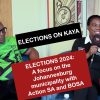-
play_arrow
On The Street On The Air | Kaya 959
- home Home
- keyboard_arrow_right CURRENT AFFAIRS
- keyboard_arrow_right Posts
- keyboard_arrow_rightThe Nugent wars and premature pronouncements on Tom Moyane
The Nugent wars and premature pronouncements on Tom Moyane
Judge Nugent’s recommendation that Tom Moyane must be dismissed by President Cyril Ramaphosa forthwith may be politically sensible but it is procedurally problematic and administratively premature. And as the SARS games meander on, we must be grateful we still have the Drakensberg Boys Choir to serenade us through it all…
By Khaya S Sithole
@coruscakhaya
There are very few things that can logically link the Drakensberg Boys Choir, President Cyril Ramaphosa, and Thomas Swahibi Moyane. And yet, in a strange week in our politics, these 3 converged in the most unlikely terms during the course of the ongoing inquiry into tax administration at the South African Revenue Service. The commission – instituted by President Cyril Ramaphosa earlier this year – followed public outcry about the governance and administrative issues at SARS. Tom Moyane, who was appointed the Commissioner by then-President Jacob Zuma in 2014, has been fingered by various witnesses as the central player in the decline and fall of SARS. This decline and fall has been characterised by waning tax compliance, missed revenue targets and executive personnel reshuffles that have decimated the organisation’s institutional memory.
Added to these woes, are the historical dilemmas that pre-date Moyane himself.
The existence or otherwise of the ‘rogue unit’ and KPMG’s interpretation thereof being the most contentious of these pre-Moyane issues. Quite crucially though, Moyane is accused of having leveraged these issues to pursue an agenda that has led SARS to its current crisis.
The problem with SARS being in crisis – governance or operational – is that it puts at risk the country’s ability to collect taxes and fund the fiscus. For a country already struggling to balance its books, this is an inconceivable calamity that must be avoided at all costs. The creation of the Commission by President Ramaphosa therefore formed a crucial part of this administration’s intervention at SARS.
Since it started, we have been given insight into what frankly sounds like a monument to incompetence at the most critical levels of the institution. The common narrative has been that the plunge into the current precipice coincided with the arrival of Moyane at SARS.
The testimony this week by the chief of IT was notable for the strange references to the Drakensberg Boys Choir and her complete inability to articulate what the state of IT infrastructure is. That such a person could hold such a position is not only an indictment on Moyane who made the appointment, but a bigger indictment on the civil service in general which keeps deploying its presumably passionate and committed human capital resources into ill-suited positions.
Moyane’s decision to boycott the Commission has inevitably left us none-the-wiser about his side of the story; his motivations and reasoning for the decisions he took at the institution. As a result, we have had to draw and infer conclusions on the basis of what has been ventilated in public.
So damning and explicit have been the testimonies against Moyane, the presiding commissioner – retired Judge Nugent – took the extraordinary step of recommending the dismissal of Moyane even before the Commission completes its work. In Nugent’s view, the plethora of evidence already tabled at the Commission is so devastating on Moyane that nothing that can be said henceforth could ever make his position tenable.
[WATCH] Resident analyst, @CoruscaKhaya speaks about the different processes taking place right now to deal with Tom Moyane #BreakfastwithDavid pic.twitter.com/upA4IVU2Z7
— Kaya 959 Talk (@KayaFMTalk) October 17, 2018
At the same time, Moyane is subject to a disciplinary inquiry being chaired by Advocate Bham SC. For anyone to be hauled before 2 parallel processes are, of course, unusual especially in South African politics where the standard seems to be lack of process rather than a multiplicity of processes. Moyane has perhaps unsurprisingly approached the Constitutional Court to query whether such a dual process is even legal.
Whilst these 3 forums are engaged in the Moyane matter, the decision by Judge Nugent to suggest the dismissal of Moyane in his interim report is uniquely problematic.
This is simply because up until now, the explanation provided to citizens is that the Nugent Commission focuses on the governance and administration crisis at SARS where he just happens to be affected as he was the Commissioner; whilst the Bham disciplinary hearing focuses on his fitness to hold office as an employee. The pronouncement by Judge Nugent, therefore, is quite awkward as it seems to abandon this idea of parallel processes.
The odd thing about it is that – in spite of what one may feel about Swahibi Moyane – the premise for both processes is that they are supposed to be independent – especially of each other – objective, fair and not be based on pre-determined outcomes. This is precisely why the wheels of justice turn as slowly as they can in order to avoid premature judgments. Take the current Omotoso case for example.

To most, it is patently clear that the man is guilty of something. And yet justice forces us to live through the heart-breaking testimony of a Cheryl Zondi and other witnesses before we deliver the verdict. We may not like it but our reservations or endorsement of the process is not the test for the administration of justice. And if we are to be consistent in this, we must surely debate the merits of the Moyane verdict being delivered in the middle of the ‘trial’.
To this end, it is theoretically possible that both the Bham and Nugent processes could reach differing conclusions on the status of Mr. Moyane. Even worse, it is even possible that the Nugent inquiry itself might – after a presentation of additional evidence and perhaps the participation by Moyane himself – find that his position is not unilaterally untenable.
Were this to happen, we would have an extraordinary situation where the President has to prioritise one view over another. What intrigues me about that possibility is that recommendations made by Commissions of inquiry are notorious simply for how they get soundly ignored by the President of the day. Labour matters, on the other hand, derive their genesis and processes from a well-established and well-respected labour relations framework in South Africa. It would, therefore, be inconceivable that the President would soundly ignore the findings of the Bham disciplinary process if they are favourable to Moyane and adopt the Nugent findings instead.
Luckily for President Cyril Ramaphosa, Moyane will not subject himself to either process and hence such conflicting results will not materialise. Which is a shame for our learning process as a country.
But hey, at least we still have the Drakensberg Boys’ Choir to serenade us through it all…
Written by: Zuko
Similar posts
-
MORE ARTICLES

Powerball Results: Draw Friday, 19 April 2024

WATCH: Gospel singer, Winnie Mashaba on her musical journey and the challenges she faced

WATCH: A focus on Gauteng as an economic HUB with Action SA and BOSA

WATCH: Big Zulu on his new body of work “Ngises’Congweni”, why he loves boxing and his creative process

From Horses to Wealth: Sizwe and the team respond to questions from their listeners
-
QUICK LINKS
UpComing Shows

The Hive
With Bonolo "Bee Sting" Molosiwa
Every "Hive" needs a Queen B and Bonolo "Bee Sting" Molosiwa is Kaya 959's honey who brings in the money. With her bubbly personality, infectious laugh, Bee Sting radiates positive energy which is all you need to get your weekend off to the best start. Don't miss the Afrobeat Dancehall Ragga (ADR) Top 10 on The Hive with Bee Sting every Saturday from 18h00 - 21h00.
close
Tune and Chill
with Tyroline Franks
Tune and Chill with Tyroline Franks on Kaya 959. Weekends, Saturday and Sunday, 15pm-18pm.
close
On the Beat
On the Beat with George Manyosi on Kaya 959. Saturday's, 18pm-21pm.
close
Touch of Soul
With T Bose
Kaya 959 takes back Sundays with A Touch of Soul, the only show bringing you soul and RnB music that touches your mind, body and spirit. The Best T in the City, T-bose takes you back to a time when music was made to last. A Touch of Soul is the perfect wind-down to your weekend. Sundays 14h00 to 18h00.
close
The Jazz Standard
with Brenda Sisane
The Jazz Standard with Brenda Sisane. Sunday's 12:00-15:00.
closeConnect with Kaya 959
DownLoad Our Mobile App
© 2024 Kaya 959 | On The Street On The Air










